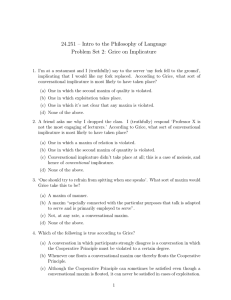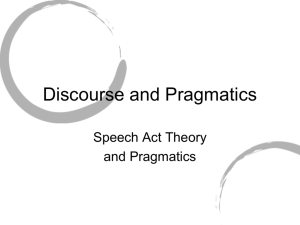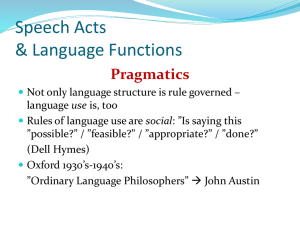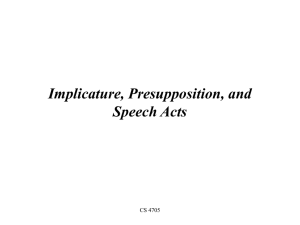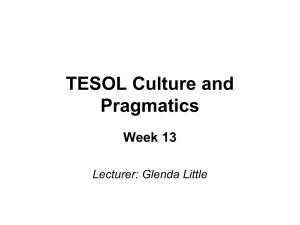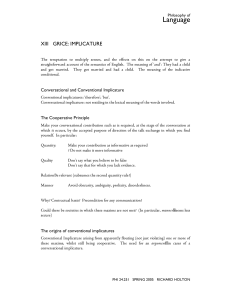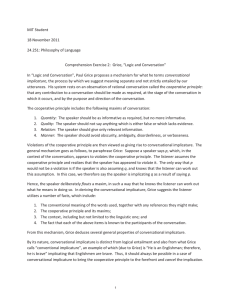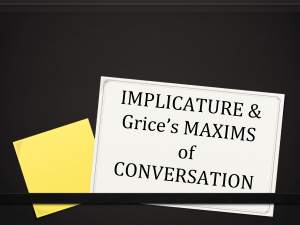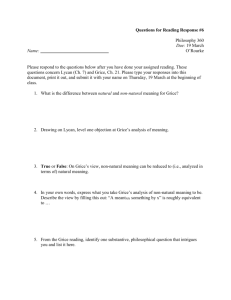Grice, Logic and Conversation Notes
advertisement
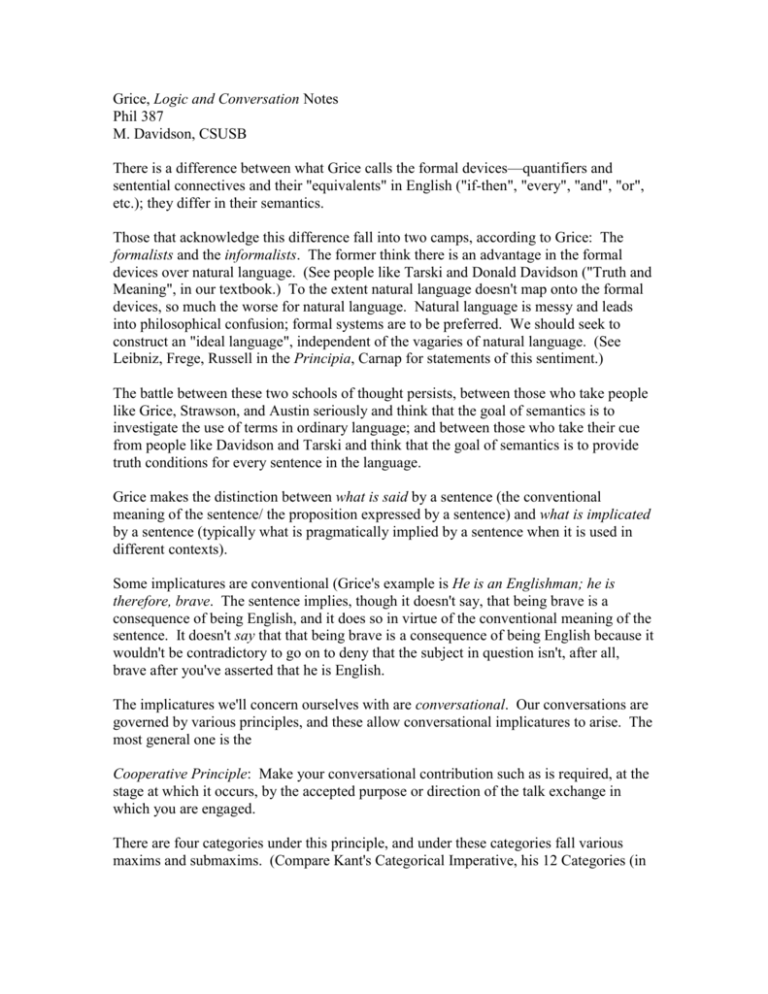
Grice, Logic and Conversation Notes Phil 387 M. Davidson, CSUSB There is a difference between what Grice calls the formal devices—quantifiers and sentential connectives and their "equivalents" in English ("if-then", "every", "and", "or", etc.); they differ in their semantics. Those that acknowledge this difference fall into two camps, according to Grice: The formalists and the informalists. The former think there is an advantage in the formal devices over natural language. (See people like Tarski and Donald Davidson ("Truth and Meaning", in our textbook.) To the extent natural language doesn't map onto the formal devices, so much the worse for natural language. Natural language is messy and leads into philosophical confusion; formal systems are to be preferred. We should seek to construct an "ideal language", independent of the vagaries of natural language. (See Leibniz, Frege, Russell in the Principia, Carnap for statements of this sentiment.) The battle between these two schools of thought persists, between those who take people like Grice, Strawson, and Austin seriously and think that the goal of semantics is to investigate the use of terms in ordinary language; and between those who take their cue from people like Davidson and Tarski and think that the goal of semantics is to provide truth conditions for every sentence in the language. Grice makes the distinction between what is said by a sentence (the conventional meaning of the sentence/ the proposition expressed by a sentence) and what is implicated by a sentence (typically what is pragmatically implied by a sentence when it is used in different contexts). Some implicatures are conventional (Grice's example is He is an Englishman; he is therefore, brave. The sentence implies, though it doesn't say, that being brave is a consequence of being English, and it does so in virtue of the conventional meaning of the sentence. It doesn't say that that being brave is a consequence of being English because it wouldn't be contradictory to go on to deny that the subject in question isn't, after all, brave after you've asserted that he is English. The implicatures we'll concern ourselves with are conversational. Our conversations are governed by various principles, and these allow conversational implicatures to arise. The most general one is the Cooperative Principle: Make your conversational contribution such as is required, at the stage at which it occurs, by the accepted purpose or direction of the talk exchange in which you are engaged. There are four categories under this principle, and under these categories fall various maxims and submaxims. (Compare Kant's Categorical Imperative, his 12 Categories (in the Critique of Pure Reason) and various maxims that are tested against the Categorical Imperative for terminology.) The four categories and maxims: Quantity (having to do with the amount of information provided) 1) Make your contribution as informative as required (for the current purposes of the exchange). 2) Do not make your contribution more informative than is required. Quality: (Supermaxim): Try to make your contribution something that is true. 1) Do not say what you believe to be false. 2) Do not say that for which you lack adequate evidence. Relation Be relevant. [Some people take this to be the central maxim involved in conversational implicature.] Manner Supermaxim: Be perspicuous. 1) Avoid obscurity of expression. 2) Avoid ambiguity. 3) Be brief (avoid unnecessary prolixity). It may be that the first maxim of quality is assumed for the other maxims to work. Now, a definition: A person S who by saying p has implicated q has conversationally implicated q provided that 1) S is presumed to be observing the conversational maxims, or at least the Cooperative Principle 2) the supposition that S is aware that, or thinks that, q, is required in order to make S's saying p consistent with the presumption in (1) and 3) S thinks that it is within the competence of the hearer to work out that the supposition in (2) is required. Look at the example on p. 373 of the remark that C hasn't been to prison yet. This seems to involve a flouting of the maxim "be relevant." The supposition that the speaker thinks that C is dishonest is required to explain the apparent flouting of the conversational maxims. The hearer is capable of working all this out. So the speaker implicates that C is dishonest. The general way this works out is at the bottom of the first column and top of the second column on p. 373. Five features of conversational implicature 1) It is cancelable (e.g. I'm writing a letter of recommendation and I comment on a candidate's handwriting and add "I'm not suggesting that the candidate isn't a good philosopher.") 2) It is nondetachable (there is no other way of saying the same thing which lacks the implicature). 3) Conversational implicatures are not part of the conventional meaning of an expression ("what is said"). 4) The implicature is carried by the saying of what is said (in a particular context), not by what is said (independent of context). 5) Because various suppositions may be made as to what is being implicated so that the Cooperative Principle and its maxims aren't being violated, we should think of what is implicated as being a disjunction of these explanations, or, perhaps, being such that there is no fact of the matter as to what is implicated.

